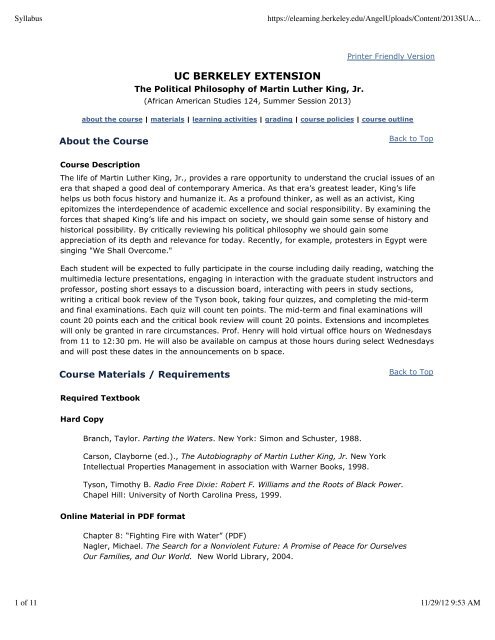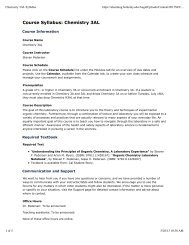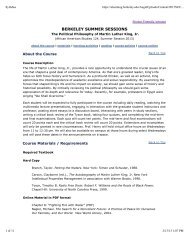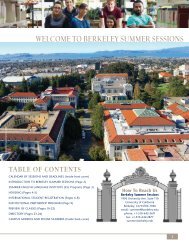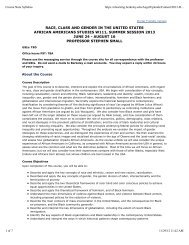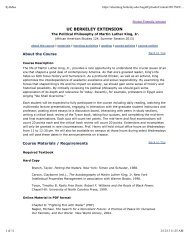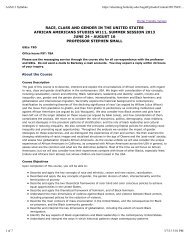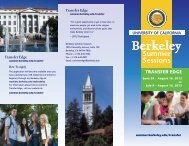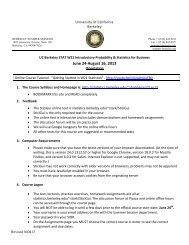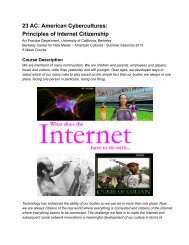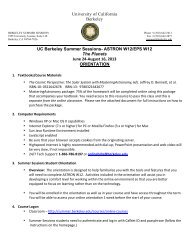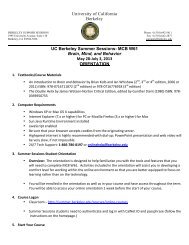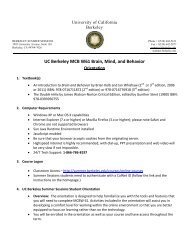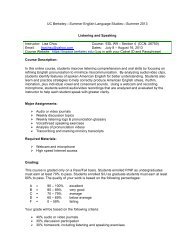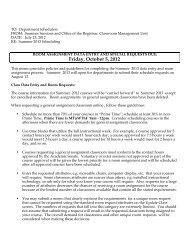UC BERKELEY EXTENSION - Berkeley Summer Sessions
UC BERKELEY EXTENSION - Berkeley Summer Sessions
UC BERKELEY EXTENSION - Berkeley Summer Sessions
Create successful ePaper yourself
Turn your PDF publications into a flip-book with our unique Google optimized e-Paper software.
Syllabus<br />
https://elearning.berkeley.edu/AngelUploads/Content/2013SUA...<br />
<strong>UC</strong> <strong>BERKELEY</strong> <strong>EXTENSION</strong><br />
The Political Philosophy of Martin Luther King, Jr.<br />
(African American Studies 124, <strong>Summer</strong> Session 2013)<br />
Printer Friendly Version<br />
about the course | materials | learning activities | grading | course policies | course outline<br />
About the Course<br />
Back to Top<br />
Course Description<br />
The life of Martin Luther King, Jr., provides a rare opportunity to understand the crucial issues of an<br />
era that shaped a good deal of contemporary America. As that era’s greatest leader, King’s life<br />
helps us both focus history and humanize it. As a profound thinker, as well as an activist, King<br />
epitomizes the interdependence of academic excellence and social responsibility. By examining the<br />
forces that shaped King’s life and his impact on society, we should gain some sense of history and<br />
historical possibility. By critically reviewing his political philosophy we should gain some<br />
appreciation of its depth and relevance for today. Recently, for example, protesters in Egypt were<br />
singing "We Shall Overcome."<br />
Each student will be expected to fully participate in the course including daily reading, watching the<br />
multimedia lecture presentations, engaging in interaction with the graduate student instructors and<br />
professor, posting short essays to a discussion board, interacting with peers in study sections,<br />
writing a critical book review of the Tyson book, taking four quizzes, and completing the mid-term<br />
and final examinations. Each quiz will count ten points. The mid-term and final examinations will<br />
count 20 points each and the critical book review will count 20 points. Extensions and incompletes<br />
will only be granted in rare circumstances. Prof. Henry will hold virtual office hours on Wednesdays<br />
from 11 to 12:30 pm. He will also be available on campus at those hours during select Wednesdays<br />
and will post these dates in the announcements on b space.<br />
Course Materials / Requirements<br />
Back to Top<br />
Required Textbook<br />
Hard Copy<br />
Branch, Taylor. Parting the Waters. New York: Simon and Schuster, 1988.<br />
Carson, Clayborne (ed.)., The Autobiography of Martin Luther King, Jr. New York<br />
Intellectual Properties Management in association with Warner Books, 1998.<br />
Tyson, Timothy B. Radio Free Dixie: Robert F. Williams and the Roots of Black Power.<br />
Chapel Hill: University of North Carolina Press, 1999.<br />
Online Material in PDF format<br />
Chapter 8: “Fighting Fire with Water” (PDF)<br />
Nagler, Michael. The Search for a Nonviolent Future: A Promise of Peace for Ourselves<br />
Our Families, and Our World. New World Library, 2004.<br />
1 of 11 11/29/12 9:53 AM
Syllabus<br />
https://elearning.berkeley.edu/AngelUploads/Content/2013SUA...<br />
Holy Bible, "The Sermon on the Mount"*<br />
Chapter 1: "Solo"-- The Mystery of Stanley Levison (PDF)<br />
Garrow, David. The FBI and Martin Luther King, Jr. Harmondsworth, Middlesex,<br />
England; New York, N.Y. Penguin Books, 1983, 1981.<br />
Chap. 6: Enforcement and Effects: The Voting Rights Act and Black Political<br />
Participation in the South, 1965-1976 (PDF)<br />
Garrow, David. Protest at Selma: Martin Luther King, Jr., and the Voting Rights Act of<br />
1965. New Haven, Conn.: Yale University Press, 1978.<br />
Chapter 5: Election Reform: Revisiting the Right to Vote (PDF)<br />
Ronald Walters, Freedom is Not Enough: Black Voters, Black Candidates, and American<br />
Presidential Politics. Lanham, Md.: Rowan & Littlefield, 2005.<br />
Chapter 1: The Religion of the Slave (PDF)<br />
Wilmore, Gayraud. Black Religion and Black Radicalism. Garden City, N.Y.: Doubleday,<br />
1972.<br />
Chapter 1: Where Are We? (PDF)<br />
King, Jr., Martin Luther. Where Do We Go From Here? New York: Harper & Row, 1967.<br />
Chapter 1: "I Am a Man" (PDF)<br />
Posner, Gerald. Killing the Dream: James Earl Ray and the Assassination of Martin<br />
Luther King, Jr. New York: Random House, 1998.<br />
Information about ordering textbooks can be found in the Course Information folder near the top of<br />
the Modules tab page.<br />
Learning Activities<br />
Back to Top<br />
Each student will be expected to fully participate in the course including daily reading, watching the<br />
multimedia lecture presentations, engaging in interaction with the graduate student instructors and<br />
professor, posting short essays to a discussion board, interacting with peers in study sections,<br />
writing a critical book review of the Tyson book, taking four quizzes, and completing the mid-term<br />
and final examinations. Each quiz will count ten points. The mid-term and final examinations will<br />
count 20 points each and the critical book review will count 20 points. Extensions and incompletes<br />
will only be granted in rare circumstances. Prof. Henry will hold virtual office hours on TBA. He will<br />
also be available on campus at those hours and will post these dates in the announcements on b<br />
space.<br />
Reading Assignments<br />
Read the assigned chapters for the Module. View the assigned multimedia presentations. The<br />
module learning objectives and multimedia lectures will provide an overview to assist students in<br />
focusing their study for quizzes, assignments, and research study.<br />
Readings and Multimedia are listed under each respective Module # button.<br />
Specific reading assignments are listed on the Course Schedule and in the specific Modules.<br />
Multimedia Assignments<br />
A list of PowerPoint lectures can be located on the Course Schedule and in the specific modules.<br />
Links to the PowerPoint lectures can be found within each Module. Note that for each narrated<br />
2 of 11 11/29/12 9:53 AM
Syllabus<br />
https://elearning.berkeley.edu/AngelUploads/Content/2013SUA...<br />
PowerPoint lecture, there is also a “PDF handout.” This supplement is available for printing and<br />
note taking.<br />
Discussions<br />
The purpose of the online discussion board is to create a group knowledge base. Please share your<br />
experiences, thoughts, outside references, and any insights you have gained from our assigned<br />
readings. Comments should provide insight and encourage meaningful discussion. Comments such<br />
as "I agree" are not appropriate unless accompanied by statements that qualify the comment<br />
through personal experience or references. Post a response that uses proper sentence structure,<br />
spelling and grammar; points will be deducted for misspelling and improper grammar.<br />
Acknowledge and show respect for the diversity of opinions presented by your classmates.<br />
Post your response to each discussion question as a reply to the topic message. This way the<br />
Message Board will be properly threaded and easy to read. If you mispost a message, simply copy<br />
the content of the message, then delete the message and repost it.<br />
Discussions are expected to be posted by the due date each week. If they are late, 5 points will be<br />
deducted from the final grade.<br />
Drop Box<br />
Submit your written assignments by attaching the document to its specified drop box. If attaching<br />
a Word-processed file, save it in rich text format (.rtf) or as a text file (.txt) before attaching. Keep<br />
copies of all your work.<br />
Book Review<br />
The Book Review will act as a measure of how well you can articulate your understanding of the<br />
material presented. It should be approximately 1500 to 2000 words in length. Adhere to the<br />
following guidelines to receive full credit for the review:<br />
1.<br />
2.<br />
3.<br />
4.<br />
5.<br />
6.<br />
7.<br />
8.<br />
Follow directions.<br />
Share thoughts, experiences, and insight on the chosen topic.<br />
You may need to use other resources besides the required texts to present your views.<br />
If applicable, display decision-making and problem-solving skills.<br />
Write in complete sentences, using proper punctuation, grammar, and spelling rules.<br />
Submit using the Drop Box in Angel by the due date.<br />
Submit documents in Microsoft Word.<br />
Cite all references using the APA format.<br />
Additional Guidelines can be found in Module Eight.<br />
Submitting Assignments<br />
It is important to start the course soon and begin submitting work regularly. Your assignments will<br />
be submitted through the Drop Box or Discussion Boards.<br />
Virtual Office Hours - Chats<br />
The Course Instructor/Facilitator will set virtual office hours when students can communicate real<br />
time (synchronously). While these chats are optional they can be valuable for case study<br />
discussion, answering questions, or reviewing for quizzes. Students can log into their Course<br />
Faculty/Facilitator’s chat room by clicking on Chat >Join (next to Course Faculty/Facilitator’s<br />
name). Faculty/Facilitator chats are optional; no points are awarded for participation. Days and<br />
3 of 11 11/29/12 9:53 AM
Syllabus<br />
https://elearning.berkeley.edu/AngelUploads/Content/2013SUA...<br />
times for Instructor/Facilitator Virtual Office Hours are posted on the course site under Faculty &<br />
Staff as well as on the Chat page.<br />
Course Evaluation<br />
<strong>UC</strong> <strong>Berkeley</strong> Extension is committed to improving our online courses and instruction. Please take a<br />
few minutes to participate in our End of Course Evaluation to share your opinions about this<br />
course. We are interested in your online learning experience, and your candid feedback will help us<br />
plan for the future and make improvements. Please take the survey before your course End Date.<br />
The evaluation does not request any personal information, and your responses will remain strictly<br />
confidential.<br />
To access the evaluation, please follow the link near the bottom of the Modules tab page.<br />
Mid-term Examination<br />
The mid-term examination will consist of multiple essay questions. Once you begin the exam, you<br />
will have 1 hour and 20 minutes to complete it. Students will be able to review their grade upon<br />
completion of the exam.<br />
Final Examination<br />
After you have completed all the other requirements, you will take a three-hour, proctored,<br />
closed-book final exam, on Friday, August 16th, time and location TBA. There will be no<br />
make-up exam. You must pass the final exam to receive credit for the course. All examinations<br />
are closed book. Any violation of this closed book policy will result in failure of course<br />
and possible academic suspension.If you will not be on campus for the final, it might be<br />
possible to take a proctored final off campus; contact Tracie Littlejohn at<br />
tlittlejohn@unex.berkeley.edu (not the professor) to make arrangements. Proctor applications are<br />
due by July 26, 2012.<br />
Quizzes<br />
There will be 4 multiple-choice quizzes. Each quiz will consist of 10 to 20 questions. Once you begin<br />
a quiz, you will have 30 minutes to complete.<br />
Students will be able to review their grade upon completion of the quiz.<br />
All quizzes are closed book. Any violation of this closed book policy will result in failure<br />
of course and possible academic suspension.<br />
Refer to Course Schedule for dates.<br />
*** If you have problems accessing or submitting the quiz please contact the <strong>UC</strong> <strong>Berkeley</strong> help<br />
desk by phone at (510) 642-3899 or email (grobtson@berkeley.edu). Also, immediately notify the<br />
Course Instructor/Facilitator by email.<br />
Course Evaluation<br />
<strong>UC</strong> <strong>Berkeley</strong> Extension is committed to improving our online courses and instruction. Please take a<br />
few minutes to participate in our End of Course Evaluation to share your opinions about this<br />
course. We are interested in your online learning experience, and your candid feedback will help us<br />
plan for the future and make improvements. Please take the survey before your course End Date.<br />
You may only take the survey once.<br />
4 of 11 11/29/12 9:53 AM
Syllabus<br />
https://elearning.berkeley.edu/AngelUploads/Content/2013SUA...<br />
The evaluation does not request any personal information, and your responses will remain strictly<br />
confidential.<br />
To access the evaluation, please follow the link near the bottom of the Modules tab page.<br />
Reminder: Your Course End Date<br />
Your access to the online classroom will expire on the course End Date, which is indicated in the<br />
initial e-mail you received when you enrolled. As you work through the course, please keep the End<br />
Date in mind, and if you want to save any commentary or assignments for future reference, please<br />
make sure to print or copy/paste those materials before your access ends.<br />
Credit Requirements<br />
Back to Top<br />
Course grades are based on the following:<br />
Assignment<br />
Module<br />
1<br />
Module<br />
2<br />
Module<br />
3<br />
Module<br />
4<br />
Module<br />
5<br />
Module<br />
6<br />
Module<br />
7<br />
Module<br />
8<br />
Total<br />
Points<br />
Quizzes 10 10 10 10 40<br />
Exams 20 20 40<br />
Book Review 20 20<br />
Discussions<br />
Discussions are expected to be posted by the due date each week. If<br />
they are late, 5 points will be deducted from the final grade.<br />
Total points 10 10 20 10 10 40 100<br />
Grading Information<br />
Final grades are assigned according to the following percentages:<br />
Letter<br />
Grade<br />
A A- B+ B B- C+ C C- D+ D D- F<br />
Percentage 100-94 93-90 89-86 85-83 82-80 79-76 75-73 72-70 69-66 65-63 62-60 <<br />
60<br />
Students earning grades below a “C” will have to repeat the course.<br />
Although your grades for assignments are recorded in the course gradebook and are available for<br />
you to see through the Report tab, you should not count on seeing your final grade recorded there<br />
by the time your access to the course ends. Your final letter grade will be mailed to you by the<br />
Registrar's office.<br />
Course Policies<br />
Back to Top<br />
Late Work<br />
Late work will be accepted only after the student has received permission from the instructor to<br />
submit it past the due date. Permission will be granted on a case-by-case basis and only under<br />
exceptional circumstances.<br />
5 of 11 11/29/12 9:53 AM
Syllabus<br />
https://elearning.berkeley.edu/AngelUploads/Content/2013SUA...<br />
Academic Integrity<br />
The <strong>UC</strong> <strong>Berkeley</strong> Rules, including the Student Code of Conduct, and documented policies of the<br />
department, college, and university related to academic integrity will be enforced. Any violation of<br />
these regulations, including acts of plagiarism or cheating, will be dealt with on an individual basis<br />
according to the severity of the misconduct. All quizzes are closed book. Any violation of this closed<br />
book policy will result in failure of course and possible academic suspension.<br />
Students with Disabilities<br />
Any students requiring course accommodations due to a physical, emotional, or learning disability<br />
must contact the Disabled Students' Program (DSP), http://dsp.berkeley.edu/services.html, at the<br />
beginning of the course with their request. The DSP will review all requests on an individual basis.<br />
Please have your Disabled Student Program Specialist send the instructor a formal request by<br />
email by July 26, 2012.<br />
Grade Dispute<br />
Any question or dispute over the earned points for a quiz, assignment, discussion, or extra credit<br />
should be addressed by first appealing in writing to the Course Faculty. An appeal of a negative<br />
decision may then be made to the Program Chair, who will follow the grade dispute policy of the<br />
University.<br />
Course Outline<br />
Back to Top<br />
You'll find complete instructions for your assignments within the course modules.<br />
Week I: Culture and the Black Experience in Historical Perspective.<br />
A. Theme: African spirituality and oral traditions<br />
Questions:<br />
1. What are the advantages and disadvantages of the oral tradition?<br />
2. What African traditions survive in the New World?<br />
Reading: Wilmore, chap. 1<br />
B. Theme: "Black" Christianity v. "White" Christianity<br />
Questions:<br />
1. How was Christianity used by the master to pacify slaves?<br />
2. How was Christianity used by the slave to promote rebellion?<br />
Reading: Wilmore, chap. 1; Branch, chap. 1<br />
C. Theme: A family of preachers<br />
Questions:<br />
1. What was sharecropping and how could you avoid it?<br />
2. How did African Americans develop a middle-class?<br />
Reading: Branch, chap. 2<br />
D. Theme: Youthful rebellion<br />
6 of 11 11/29/12 9:53 AM
Syllabus<br />
https://elearning.berkeley.edu/AngelUploads/Content/2013SUA...<br />
Questions:<br />
1. Who were King’s role models?<br />
2. Why does King rebel against his father’s profession?<br />
Reading: Carson, chaps. 1 & 2<br />
Quiz<br />
Week II. From Intellectual to Activist<br />
A. Theme: The Scholar Preacher<br />
Questions:<br />
1. Is emotion escapism or a route to God?<br />
2. Are humans essentially good or essentially evil?<br />
3. Is it possible to love a group?<br />
Reading: Carson, chaps. 3 & 4 Branch, chaps. 3 & 4<br />
B. Theme: Gandhi and King Interview with Prof. Kusum Singh<br />
Questions<br />
1. What are the differences between Gandhi and King?<br />
C. Theme: The Hero in History<br />
Questions:<br />
1. Why did Coretta give up her career and move South?<br />
2. Why King and not Vernon Johns?<br />
Reading: Branch, chaps. 5-9<br />
D. Theme: The Montgomery Story<br />
Questions:<br />
1. What impact did the Brown decision have?<br />
2. How was the law used to frustrate protest?<br />
Reading: Carson, chaps. 6-9<br />
Quiz<br />
Week III. Building a Movement<br />
A. Theme: Institutionalizing Protest<br />
Questions:<br />
1. Why establish another civil rights organization?<br />
2. What is Eisenhower’s response to civil rights?<br />
Reading: Branch, chaps. 10-13<br />
7 of 11 11/29/12 9:53 AM
Syllabus<br />
https://elearning.berkeley.edu/AngelUploads/Content/2013SUA...<br />
B. Theme: Charismatic v. Collective leadership Interview with Prof.<br />
Hardy Frye<br />
Questions:<br />
1. What is charisma and who has it?<br />
2. How does SNCC challenge King’s leadership?<br />
Reading: Carson, chaps. 10-15<br />
C. Theme: Birmingham: Civil Rights Comes of Age<br />
Questions:<br />
1. What role did King play in Kennedy’s election?<br />
2. How can you justify breaking the law?<br />
3. Why did the Albany movement fail?<br />
Reading: Carson, chaps. 16-19<br />
D. Theme: The March on Washington<br />
Questions:<br />
1. Why did John Lewis have to change his speech?<br />
2. Why has King’s address become iconic?<br />
Reading: Branch, chap. 22; Carson, chap. 20<br />
Week IV. Legislating Change<br />
Mid-term Examination – July 10th<br />
A. Theme: A New Political Will<br />
Questions:<br />
1. Why is the 1964 Civil Rights bill more effective than earlier bills?<br />
2. How did Kennedy’s assassination effect the movement?<br />
Reading: Carson, chaps. 21 & 22<br />
B. Theme: Reward and Punishment<br />
Questions:<br />
1. How did the Nobel Prize affect King?<br />
2. Why did the FBI want to silence King?<br />
Reading: Carson, chap. 24; Garrow, chap. 1<br />
C. Theme: The Mississippi Challenge<br />
Film: "Freedom <strong>Summer</strong>"<br />
Questions:<br />
1. How did the involvement of Whites change SNCC?<br />
8 of 11 11/29/12 9:53 AM
Syllabus<br />
https://elearning.berkeley.edu/AngelUploads/Content/2013SUA...<br />
2. How did the MFDP influence today’s Democratic Party?<br />
Reading: Carson, chap. 23<br />
Week V. Selma and Voting Rights<br />
A. Theme: Democracy<br />
Questions:<br />
1. Why weren’t previous voting laws effective?<br />
2. Did Malcolm go to Selma to challenge King?<br />
Reading: Carson, chap. 25<br />
B. Theme: Selma<br />
Questions:<br />
1. How was Selma different from Birmingham?<br />
2. How do media influence protest?<br />
Reading: Carson, chap. 26<br />
C. Theme: Implementation and Evasion<br />
Questions:<br />
1. Why was the 1965 Voting Rights Act effective?<br />
2. How has Black voting power been diluted?<br />
Reading: Garrow, chap. 6, Walters, chap. 5<br />
Film: "Fundi: The Ella Baker Story"<br />
Quiz<br />
Week VI. The Northern Movement<br />
A. Theme: Watts<br />
Questions:<br />
1. Why did violence erupt in the North?<br />
2. Why didn’t the rioters respond to King?<br />
Reading: Carson, chap. 27<br />
B. Theme: The Chicago Campaign<br />
Questions:<br />
1. Why did King pick Chicago?<br />
2. How did the Daley machine defeat King?<br />
Reading: Carson, chap. 28<br />
9 of 11 11/29/12 9:53 AM
Syllabus<br />
https://elearning.berkeley.edu/AngelUploads/Content/2013SUA...<br />
C. Theme: Black Power<br />
Questions:<br />
1. Why did SCLC, CORE and SNCC join the Meredith March?<br />
2. Why did King oppose Black power?<br />
Reading: Carson, chap. 29<br />
D. Theme: The Rise of Identity Politics<br />
Questions:<br />
1. How does the rise of Black power radicalize King?<br />
2. What influence does Black power have on other groups?<br />
Reading: King, chap. 1<br />
Quiz<br />
Week VII. From Vietnam to Iraq<br />
A. Theme: Moving from domestic to international affairs<br />
Questions:<br />
1. What are King’s objections to the War in Vietnam?<br />
2. Why isn’t King supported by other civil rights leaders?<br />
Reading: Carson, chap. 30<br />
B. Theme: Lessons for today Interview with Prof. Michael Nagler<br />
Questions:<br />
1. What are the similarities and differences between Vietnam & Iraq?<br />
2. Is a non-violent foreign policy feasible?<br />
Reading: Nagler, "Fighting Fire with Water"<br />
C. Theme: The Poor People’s Campaign<br />
Questions:<br />
1. Is a multi-racial coalition possible?<br />
2. How did King’s tactics change from Montgomery to D.C.?<br />
Reading: Carson, chap. 31<br />
D. Theme: Memphis<br />
Questions:<br />
1. Why did violence break out in Memphis Are economic rights as<br />
important as civil rights?<br />
Reading: Carson, chap. 32<br />
10 of 11 11/29/12 9:53 AM
Syllabus<br />
https://elearning.berkeley.edu/AngelUploads/Content/2013SUA...<br />
Week VIII. The Legacy<br />
A. Theme: Assassination<br />
Questions:<br />
1. Did Ray act alone?<br />
2. Why did the King family support Ray?<br />
Reading: Posner, chap. 1<br />
B. Theme: Negroes With Guns Film: "Negroes with Guns"<br />
Questions:<br />
1. What is the legacy of picking up the gun?<br />
2. What unites King with Malcolm and Williams?<br />
Reading: Tyson, all Book Review due—August 12th<br />
Book Review due – Auguest 6th<br />
C. Theme: Black Leadership Today<br />
Questions:<br />
1. What happened to SCLC?<br />
2. What are the similarities and differences between Jackson & King &<br />
Obama?<br />
D. Final Examination – Friday, August 16th, time and location TBA.<br />
© 2011 <strong>UC</strong> Regents. All rights reserved.<br />
11 of 11 11/29/12 9:53 AM


